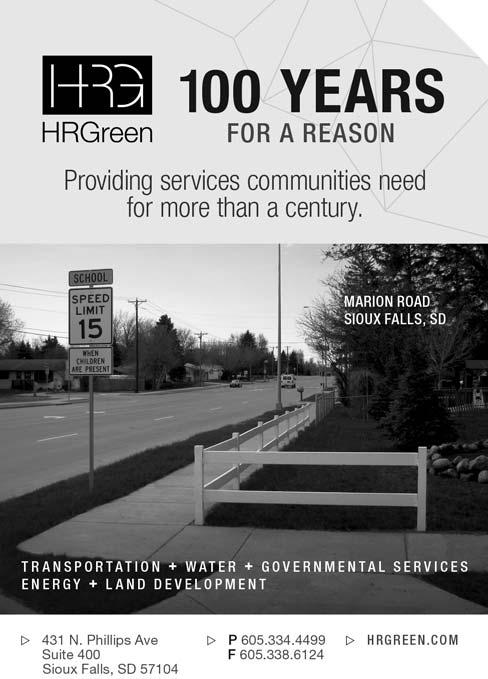
6 minute read
NLC Federal Advocacy Update
National League of Cities Federal Advocacy Update
National City-County Task Force on the Opioid Epidemic Holds Inaugural Convening
Advertisement
Yucel Ors Local leaders from across the country have come together to take action in response to the rapid escalation and deadly impact of prescription drug abuse and heroin use in cities and counties. The National City-County Task Force on the Opioid Epidemic convened on April 7 for its inaugural meeting in Washington, D.C. to share experiences, engage with national experts and explore solutions to stem the tide of drug abuse and related fatalities.
A joint initiative by the National League of Cities (NLC) and the National Association of Counties (NACo), the 24member task force explored how cities and counties can strengthen collaboration with each other and state, federal, private-sector and non-profit partners to tackle the opioid crisis.
Prevention and education, treatment, public safety and community wellness were front and center on the task force’s agenda. Local leaders shared information about challenges and effective local responses that could be replicated in communities across the country.
Following the convening, the task force will take the following actions: j Continue national dialogues where city and county leaders will explore the main impacts of this crisis and comprehensive responses that have proven to be effective; j Convene special forums, webinars and other opportunities to engage with national experts, federal, state and other partners; and j Publish a national summary report with policy recommendations and best practices that promote prevention and education, effective treatment options, public safety and community wellness.
Visit www.nlc.org/OpioidTaskForce for more information.
Senate Moves Forward with Federal Preemption in FAA Bill
Matthew Colvin The Senate voted to move forward with their 18-month reauthorization of the Federal Aviation Administration (FAA). Unfortunately, the bill brought to the floor by Commerce Committee Chairman John Thune (R-SD) and Ranking Member Bill Nelson (D-FL) still contains language that would tell cities and states they cannot regulate when and where drones fly in our own communities. Instead, the FAA would be the sole authority on whether or not unmanned vehicles fly over our schools, homes, parks, and crowded events like parades and sporting events.
NLC is working hard to build momentum for a bipartisan amendment (Senate Amendment 3464) introduced by Senators Feinstein (D-CA), Tillis (R-NC), and Blumenthal (D-CT) that will spell out a clear role for states and municipalities to restrict drone use.
The Wall Street Journal published an article by Arizona State University Law School professor Troy A. Rule criticizing this dangerous overstep by leadership in the Commerce Committee. In his article, Professor Rule cited NLC’s letter to Senate leadership, urging them to reconsider preempting local authority on the airspace just feet above our heads. In addition, NLC published a blog article on citysspeak.org, entitled 3 Things Every City Should Know About Drones (see pages 26-27).
With the bipartisan amendment now filed, NLC is asking city officials to send a letter your senators urging them to cosponsor Senate Amendment 3558 to support local control of drones.
Water Infrastructure Bills Set for Senate Action
Carolyn Berndt With the drinking water crisis in Flint, Michigan, still very much on the minds of legislators, NLC continued its advocacy in support of bills that would provide funds for communities nationwide to address aging infrastructure and conduct lead pipe removal projects.
The first bill, the Firm, Unwavering National Dedication to Water Act (FUND Act, S. 2583) would reauthorize and more than triple the authorization level for the Drinking Water and Clean Water State Revolving Loan Fund programs. The second bill, the Grants and Education to Tackle Homeowner Exposure to Lead Ensuring American Drinks Only from Unpolluted Taps Act (GET THE LEAD OUT Act, S. 2588) would provide grants to local governments for lead pipe replacement. Both bills are sponsored by Senator Benjamin Cardin (D-MD) and have been referred to the Senate Committee on Environment and Public Works (EPW).
It is expected that the EPW Committee will mark up these bills at the end of April, and they could potentially be included in the Water Resources and Development Act that both the Senate and House are currently drafting.
In addition to these bills, NLC continued to urge senators to support the Drinking Water Safety and Infrastructure
Act (S. 2579). This proposal would provide a $220 million aid package for the City of Flint to resolve the drinking water crisis, as well as funding to support communities with aging water systems nationwide. The Flint aid proposal is one of a handful of major items on the Senate’s agenda before appropriations work gets underway and since there is still no agreement on a path forward for the Flint aid proposal, it is important that you send a letter to your senators today and tell them to support S. 2579.
Fed Rule Doesn’t Go Far Enough
Carolyn Coleman The Federal Reserve released its final rule that would amend the 2014 Liquidity Coverage Ration rule and admit some muni securities as high quality liquid assets (HQLA). While the rule is less restrictive than what the Federal Reserve initially proposed last summer, it still has significant shortcomings (such as permitting HQLA designation to GO bonds but not revenue bonds). The Federal Reserve’s rule would also only apply to two of the nine bank holding companies with over $250 billion in assets affected by the 2014 rule, so would not be nearly as inclusive of muni securities as a rule that is coordinated rule with the Federal Deposit Insurance Corporation (FDIC) and the Office of the Comptroller of Currency (OCC), or what is outlined in the House-passed H.R. 2209.
In coordination with the Government Finance Officers Association (GFOA) and others, NLC will be on the Hill to meet with offices of members of the Senate Banking Committee to discuss our ongoing concerns with the 2014 LCR Rule and the Federal Reserve’s final rule, and stressing the need for Congress to enact legislation that would require the Federal Reserve, FDIC and OCC to classify all investment-grade, liquid and readily marketable municipal securities as HQLA. Only legislation will compel the FDIC and OCC to act on this issue, and ensure that the greatest number of municipal securities can be classified as HQLA.
Department of Justice Resumes Equitable Sharing
Yucel Ors The Department of Justice (DOJ) announced it is resuming equitable sharing payments to states and local governments through its Asset Forfeiture Program. The payments were temporarily suspended late last year when $1.2 billion in program funds were rescinded. The rescission threatened the financial solvency of the Assets Forfeiture Fund, and forced the Department to take costcutting steps across all discretionary programs, including suspending the equitable sharing payments.
Congress is still considering legislation that would limit DOJ’s future ability to transfer property and funding to state and local law enforcement agencies through the program. While NLC supports program reforms, city leaders oppose legislation that would limit local law enforcement’s ability to participate in the program and call on Congress to maintain the program, while also establishing appropriate requirements that safeguard individual rights and remove financial incentives for potential misconduct.
Reprinted from National League of Cities, www.nlc.org.











